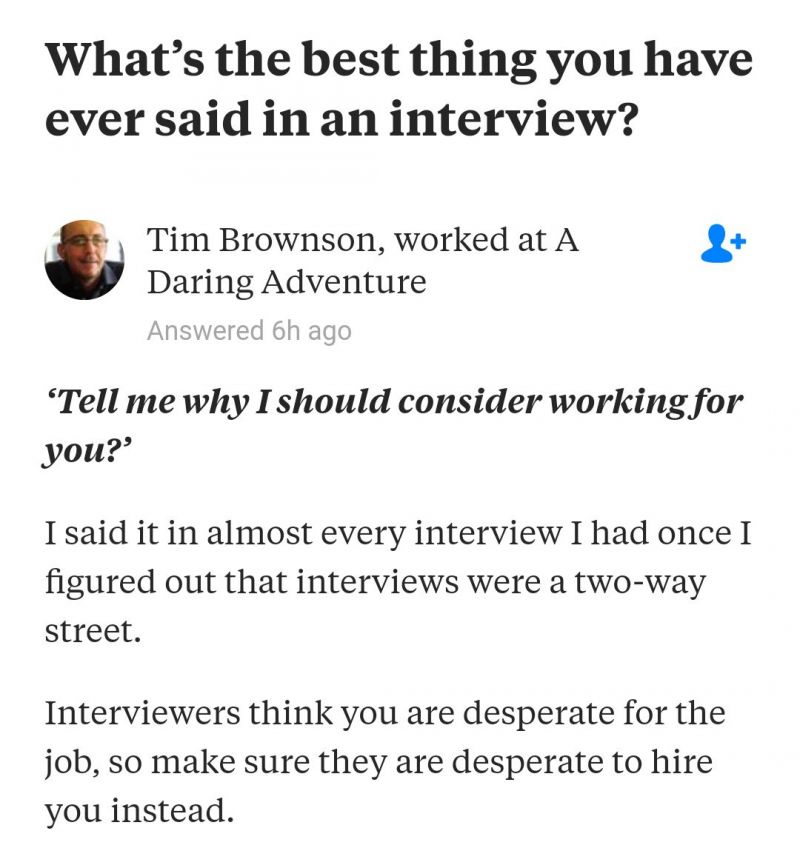Ranter
Join devRant
Do all the things like
++ or -- rants, post your own rants, comment on others' rants and build your customized dev avatar
Sign Up
Pipeless API

From the creators of devRant, Pipeless lets you power real-time personalized recommendations and activity feeds using a simple API
Learn More
Comments
-
Reading this, I had some thoughts.
I have a number of bonafides myself, but also feel that using them in an attempt to justify the superiority of my argument is rhetorically unsound as it carries the implication of a prejudice favoring my own ideas and by extension comes close to ad hominem (my experience is greater then yours, so I win by appeal to my own authority). As presented it seems less a correction and more a line in the sand, something I immediately turn off on, even given his response bore more than a little conceit. Granted it may have more verbiage in person, which in fully willing to accept.
As a lead, I would usually take the tack of challenging the misconceptions and seeing if they can logically back their way out of it/take the hint and approach it a little more politically. I've found over the years you have to treat the male ego delicately, and paths of interrogation should allow for the saving of face in order to avoid hostility. Given the interview is the best a company will ever treat you, I wouldn't be surprised if he had been embarrassed by his own actions to the point of losing interest in the opportunity.
Just my thoughts! -
 Potherca2334y@SortOfTested It did indeed have more verbiage in person. There were already some doubts about the cultural match.
Potherca2334y@SortOfTested It did indeed have more verbiage in person. There were already some doubts about the cultural match.
During the interview with me, the candidate was misquoting the material in question and did not want to take any gentle (or slightly less gentle) corrections.
There were other moments in the interview where the candidate only seemed friendly and competent as long as I agreed with what he was saying.
It got to the point where the candidate started talking down at me, asserting that he was an authority and I should be grateful for him sharing his knowledge and insights with me...
I didn't pull the "Look, I know what I am talking about, I wrote the damned thing" card until after it was clear that he would not be able to function within the team with the mindset.
Related Rants

 Stackoverflow.
Stackoverflow. For those of you who are having interviews ... remember this
For those of you who are having interviews ... remember this
After going through the regular process of talking to HR/Recruitment and passing the casual interview with a team-mate for cultural compatibility, I got the task of grilling a candidate on some technical matters. This being a PHP job, we got to talking about PSRs (PHP Standards Recommendations).
As he seemed to take pride in his knowledge of PSRs, I decided to focus more closely on that.
So we got to a recomendation regarding dependency injection containers. Nothing special, and he seemed to know his stuff. At that point, he made a statement that parts of that recommendation were a bit stupid.
Now, I hate to put people in their place, but his statement did not match what that specific PSR stated. So I gently tried to correct him. The candidate, being on fire thus far, pointed out that I should trust him on this, as he clearly knew his stuff.
Again, I didn't like having to do this, but I also did not like him having a misconception about a topic he was, otherwise, really on top of...
So I asked him to trust *me*, as I was one of the writers who contributed to the standard.
The true test here, of course, wasn't if he knew all the minutia of every standard but how he would react to being corrected.
We, as developers, are wrong all the time. Its how we learn and evolve. So being able to accept that is vital.
Sadly, he did not respond too well and sunk into a bit of a sullen silence. At first I though maybe I'd scared him or that he was afraid of having made a gaff but it soon turned out he genuinly did not like being wrong.
Sadly, I had to advise against hiring him.
rant
candidate
lessons learned
interview
job interview